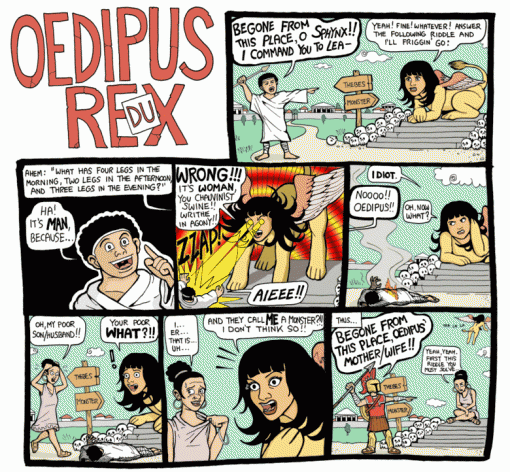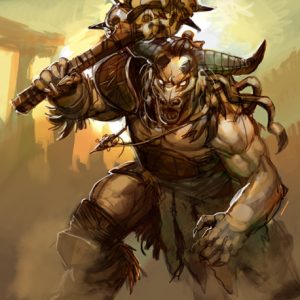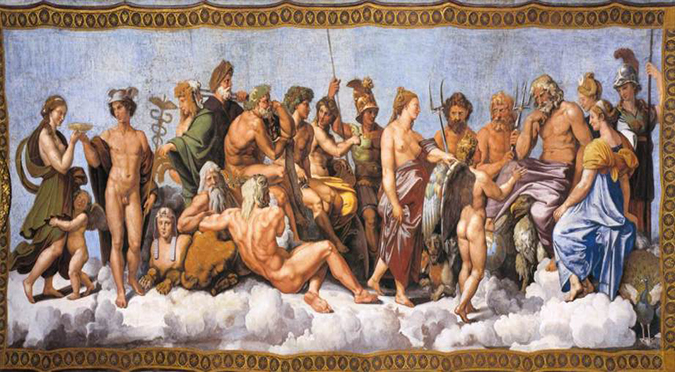
"Pretend Radio" Podcast Interview with Erik Slader
August 22, 2013
World War One: THE “GREAT” WAR
September 10, 2013Previously on “Epik FAILs” we covered the Trojan Wars and the Greek / Roman Tale of Creation.

The Olympians, chilling in the stratosphere.
The Ancient Greeks, like almost every single early culture, were very superstitious and believed in a multitude of gods. They had a god for just about everything, not to mention an endless supply of semi-tragic heroes.
When Rome came to power it had virtually no culture of its own, so it simply ‘borrowed’ the stories, traditions, and works of art from others, as it devoured and absorbed its Mediterranean neighbors like a black hole. The Romans straight up stole the Greek gods, renamed them, and figured no one would notice. For instance, Zeus is Jupiter, Aries is Mars, Hermes is Mercury, Aphrodite is Venus, Poseidon is Neptune, Hades is Pluto, and Apollo is… Apollo.
There are some differences between the Greek and Roman myths, but for the most part it’s the same damn story: Titans create Gods. Gods destroy Titans. Gods create Man. Man Fails. Woman inherits the Earth?

Zeus and the gang placing bets on their favorite mortals.
Without the miracles of modern science, these long gone civilizations assumed that everything was magical, and that the fates had a hand in the chaos that surrounded them. Like their primitive cave-dwelling ancestors (and many of their descendants) they were scared of thunder, and assumed it meant the gods were angry at them for something. Mankind has always feared what it does not understand. Therefore humans have always grasped for answers where there are none, to make sense of their senseless world.
 We looked to the heavens, and saw them staring back at us…
We looked to the heavens, and saw them staring back at us…
Thusly the following tales evolved over the centuries much like comic book cannon complete with crossovers and retcons, and have been reinterpreted in countless ways from several contradicting sources. There are several modern adaptations like many of the Sword and Sandal films from the early days of cinema (of stop-motion claymation fame), family friendly cartoons, and even 90’s TV series, that may or may not have starred Lucy Lawless as a badass lesbian Amazon warrior princess by the name of Xena.
The following tales that I’ve compiled together here are summaries based on interpretations from the original source material which is oftentimes contradictory. Furthermore the original versions of these stories (much like the Grimm Fairy Tales) are not exactly Rated G. The dark and gritty tone of these fanciful parables is akin to the “God of War” game series. Some of these myths and legends may have even been partially based in some small nugget of truth, but like so many ancient stories, these myths originate from a time before Herodotus came up with the concept of “history” itself, so whose to say?
Be warned, most of these stories do not have a happy ending… in fact the one consistent theme these larger-than-life Greek tragedies have is that they they were all Epic Fails!

Kratos approves this message.
OF TITANS AND TROJANS, PROMETHEUS AND PANDORA
The Olympian Gods rebelled against the Titans, overthrew them, locked them in Tartarus, and then created mankind. Zeus / Jupiter ruled from the skies, spending most of his free time practicing his throw with lightning bolts (and had a propensity for sleeping around with everyone but his wife, Hera), Poseidon / Neptune was the master of the sea with a short temper, a Trident in one hand and a beer in the other, and finally, Hades / Pluto got the shitty end of the stick pulling shifts in the zombie-ridden Underworld.
Everything was going fine until Prometheus and Pandora went and effed up existence itself. Prometheus gave man fire (bad idea), and then Pandora went and made things worse by unleashing evil into the world, out of sheer curiosity. (FAIL) Zeus then decided to blame everything that ever went wrong on Prometheus, so as punishment for his “crimes against the gods” had him chained to a rock where an eagle would peck out his immortal liver every day before growing back the following night. Fun stuff. (This is presumably why Sisyphus never complained about having to roll a boulder up a hill for all eternity.)
The Trojan War that followed was a human-centered event which was promptly blamed on the gods (recounted in Homer’s Epic poem, ‘The Iliad’) in which the Greeks breached the walls of Troy utilizing a wooden metaphor.

Other major Gods of the Olympian Pantheon include: Aphrodite / Venus, the gorgeous Goddess of love, sex, and ditzy airheads, Aries / Mars, the badass God of War (who happened to be screwing Aphrodite on the side), Eros / Cupid the love child of Aries and Aphrodite, Hephaestus the absent-minded gearhead husband of Aphrodite (who doesn’t realize Aries is getting it on with his wife behind his back), Eris / Strife the goddess of discord, chaos, and patron of the two dollar bill (the one behind that whole Trojan fiasco), Hermes / Mercury the messenger, God of Plot-Devices, and retro-rip-off of The Flash, Athena, the smart one, Dionysus, the drunk one, Apollo the youthful sun god riding around the sky in a flaming chariot, and the rebellious wild-child of the bunch: the arrow-launching Artemis / Diana, goddess of the hunt.
THE PERSEPHONE MYTH

Once upon a time, Zeus and Demeter (goddess of the harvest) had a girl named Persephone.
To say Persephone was gorgeous would be a disservice to her superficial looks. If there was a Greek Goddess edition of Maxim’s Top 100 hottest women issue, Persephone would be up there, right behind Helen of Troy, Aphrodite, and a Pre-Gorgon-Medusa. As with most gifts from the gods, her smokin’ hot body happened to be a curse.
To sum it up, the Lord of the Dead, Hades, had a hard-on for Persephone. One day, while Persephone was frolicking in a flowery field, Hades, slinked up behind her like a creepy emo stalker, and pulled an old-timey-villain move by capturing her, dragging her to hell, and forcing her to marry him, making them the oddest couple since Evan Rachel Wood hooked up with Marilyn Manson.

Persephone became the Queen of the Damned, and immediately set about making Hell a slightly less dismal place with her homemaking skills. She also became good friends with Hades’s three headed mutant dog, Cerberus. Meanwhile, Persephone’s absence from the realm of the living causes her mother to grieve to the point that plants die, and the air becomes frigid, presumably because nature itself is Demeter’s mood ring. This long winter eventually came to an end when Demeter worked out a deal with Hades for her daughter to visit her for half the year, and this somehow explains the changing of the seasons.
OEDIPUS REX
An Athenian tragedy written by the playwright Sophocles about a Theban King who bangs his mom without realizing it through a series of unfortunate / convoluted events including an Oracle’s prophecy, infanticide, incest, and the riddles of a self-destructing Sphinx.

PERSEUS VS MEDUSA

The story of Perseus is a well known one, somewhat thanks to “Clash of the Titans” (1981) as well as its CGI-infused remake (2010) and somewhat lackluster sequel, “Wrath of the Titans” (2012).
Perseus was one of several alleged demi-gods illegitimately fathered by Zeus himself. Naturally, as a bastard of Zeus he had a heroic destiny to fulfill. It all started when King Acrisius heard a rumor from the Oracle of Apollo that his daughter (Danae)’s offspring would be the death of him.

“I believe my reputation precedes me.”
Fearing the vengeance of his unborn grandson, Acrisius locked Danae away in a bronze tower. This plan worked about as well as you might expect against the prophecy of a delphic Oracle: about as well as a horny teen swearing abstinence for life. As it turns out, Zeus had a thing for damsels in distress.
Rather than saving them however he would just seduce them with magic instead. Nine months later Perseus was born. A horrified Acrisius did the only sensible thing a concerned father could do, he locked his daughter and her son in a coffin then threw it out to sea.
As fate would have it, a fisherman from the island of Seriphos caught the coffin in a net. When Perseus came of age, the King of Seriphos, Polydectes, asked for his mom’s hand in marriage. When Danae rejected him, he decided she might change her mind with her only son out of the way. So Poly-DICK-tees hatched a convoluted scheme to destroy young Percy. Polydectes arranged a marriage with some other chick and demanded wedding gifts from everyone.
When Perseus came to the shower empty-handed, the King called him out on this, “Yo P-Dawg, where’s my horse?”
 “Um, I don’t have any spare horses,” Perseus replied.
“Um, I don’t have any spare horses,” Perseus replied.
“What gives?” Polydectes cornered the young man, causing a scene.
“Dude,” Perseus explained, “I’m kinda broke, cut me some slack bro.”
“Whatevs free loader, talk to the hand.”
As the spoiled King began to turn away, Perseus was pissed. “You know what? I can get you anything in the world!” he bragged.
“Oh? Is that so?” Polydectes smiled. “Hmmm, well I have always wanted the head of a Gorgon… unless you’re chicken…”
The crowd gasped at the mere mention. The Gorgons were once three beautiful maidens who were cursed by Athena, turned into hideous reptilian monsters with snakes for hair, and a stare that turned mortals to stone. The most popular, er notorious was Medusa. Without thinking, Perseus accepted the challenge, “FINE!”
After realizing the quest he’d just undertaken, Perseus probably fainted. Upon reawakening, our noble hero was greeted by Hermes and Athena. The postal god greeted the bewildered Perseus, “I am Hermes and this is our sister Athena. Yes, you are a son of Zeus. We have some things that may help you in slaying Medusa.” The oddly dressed messenger took off his winged Nike sandals and handed them to Percy. Athena turned to him with a reflective shield to use against Medusa, and explained the science of light refraction. “You must find the Graeae and get them to tell you how to get to the Nymphs of the North, they will give you the cap of darkness and give you a magic wallet and tell you how to get to the Gorgons’ lair.”

Now that Perseus had his cheat codes he ventured forth.
The Graeae, more commonly referred to as The Fates, were three elderly women with a single communal eye between them, with the convenient ability to see the future. Ironically they didn’t see Perseus coming. Perseus reluctantly trudged towards the dark cavern of the Graeae. Hiding in the shadows, Perseus ninja-ed his way towards the hideous hags as they argued over what to order for take out.
Perseus waited for his moment, and seized it. The demi-god leapt from the shadows and tackled the ancient trio, intercepting the squishy magic eye. The Fates cried out in shock, and fury as the hero dangled their precious eye over a precipice. Perseus used this to his advantage and squeezed some information out of them. After gaining some intel, Perseus made his way to the Nymphs of the North who gladly equipped him with a magic wallet, and the Helm of Darkness which Perseus Zelda-hoisted over his head. The Helmet of Hades was kinda like the cloak of invisibility from Harry Potter. Now he just had one more errand to run: retrieve Medusa’s venomous mug.

Don’t look at-! Aw damn, too late…
With the flying sandals, invisibility helmet, mirror shield, and magic wallet in tow, Perseus flew straight to the island of Medusa which he was able to easily ascertain by her collection of petrified statues throughout her garden. To Percy’s surprise Medusa was having a sleepover with her sisters who’d all passed out together after a Sex and the City marathon. Careful not to look them in their faces, as he silently approached, Perseus used his reflective shield, raised his sword, and decapitated the fugly bitch.
Perseus figured that’d be the end of it, as he packed the Gorgon’s head into his sack, but as it turns out Medusa’s sisters weren’t exactly heavy sleepers. Plus, the acidic blood spilt from Medusa’s headless corpse randomly spawned dozens of poisonous scorpions, Pegasus the winged horse, and a random sword swinging giant named Chysaor, but that’s another story entirely. Our very confused protagonist jumped aboard the equally bewildered Pegasus as he donned his helmet of invisibility and lost the cranky Gorgons.
 On his way back to give Polydectes the trophy (and a piece of his mind), Perseus and Pegasus made a few stops along the way. At one particular rest stop, Perseus noticed a maiden chained to the rocks by the edge of the sea. He hears a bellowing voice declare “Release the Kraken!” at which point a gigantic Godzilla-size sea monster begins rising out of the sea. WTF?
On his way back to give Polydectes the trophy (and a piece of his mind), Perseus and Pegasus made a few stops along the way. At one particular rest stop, Perseus noticed a maiden chained to the rocks by the edge of the sea. He hears a bellowing voice declare “Release the Kraken!” at which point a gigantic Godzilla-size sea monster begins rising out of the sea. WTF?
Once Perseus is positive that he’s not hallucinating, he grabs his bag and propels himself at the scaly creature. Once up in the monster’s grill, the demi-god shoves Medusa’s hideous head in its face. The insatiable beast either turns to stone and crumbles, or simply loses its appetite and retreats to the safety of the ocean…
After defeating Poseidon’s vicious pet Rancor, Perseus awkwardly greets the nude woman chained to a rock. She introduces herself as Princess Andromeda, the daughter of Cepheus and Cassiopeia. She explains the events leading up to her current predicament, which may or may not have involved a sorority prank that offended the gods.
Perseus proposes to Andromeda on the spot. Before getting married however, Perseus needed to return home and tell his mother, at which point he realized that Polydectes had made her his servant. Perseus lost his shit, marched up to the palace, barged in, and threw Polydectes and his homies the severed head of Medusa, turning them all to stone, their priceless look of surprise forever etched on their faces.

You want it?! Come and get it!!!!
Now that his mother was safe, Perseus eloped with Andromeda. On their honeymoon, Perseus decides to compete in the Olympic games. During one of the challenges, Perseus accidentally throws a discus into the crowd instantly killing one of the spectators: King Acrisius, his grandfather, fulfilling his destiny through a mere coincidence. Andromeda and Perseus live happily ever after together… well at least until old age claimed them (a rare fate in the world of Greek Mythology), and the two were given constellations in their honor.
HERCULES / HERACLES

Heraklês, or Hercules as he’s more often referred to, is probably the most famous of the Greek Heroes. King Leonidas of Sparta, Alexander the Great of Macedonia, and Julius Caesar of Rome all claimed to be among his countless descendants.
Born of Zeus’s consistent infidelity, and endowed with Hulk-like super strength, this Tarzan-esque proto-Superman was an archetypal prototype for all superheroes that followed in his footsteps. Ironically Heracles means “the Glory of Hera”, named after his arch enemy, the Queen of Olympus herself. From Gordon Scott to Kevin Sorbo, there have been a lot of interpretations of Hercules over the years. Disney’s ‘Hercules’ actually does a fairly decent job of retelling the tale, minus a few of the more disturbing elements of this gritty tale…
 The Son of Perseus (Electryon)’s daughter (Alcmena) gets knocked up by Zeus while her husband (Amphitryon) is away at war. Meanwhile, Hera was getting quite fed up with Zeus’s consistent cheating and attempted to have baby Herc assassinated via serpent, but the lil bodybuilder made quick work of the deadly vipers.
The Son of Perseus (Electryon)’s daughter (Alcmena) gets knocked up by Zeus while her husband (Amphitryon) is away at war. Meanwhile, Hera was getting quite fed up with Zeus’s consistent cheating and attempted to have baby Herc assassinated via serpent, but the lil bodybuilder made quick work of the deadly vipers.
At one point, Athena somehow tricked Hera into breastfeeding lil Herc, but he apparently sucked too hard, causing her to yank away, creating… the Milky Way galaxy?!
Growing up with incredible strength among mortals wasn’t always easy. This one time for instance he threw a tantrum and killed his music teacher with a lyre. As a result of this involuntary act of negligent manslaughter, Hercules was exiled to Mt. Cithaeron. Young Hercules grows up living out a relatively normal life, aside from saving townsfolk from natural disasters, and monstrous creatures. In gratitude for protecting his citizens, the King / Mayor of Thebes awarded Hercules his daughter, Megara as his betrothed.
Herc and Meg live happily ever after? Haha no.
Rather than simply confronting Zeus, or filing for divorce, Hera decides to take out her frustration on his other kids. Hera is one particularly devious step mom. She waited till just the right moment to eff things up as much as possible when he least expects it. The scorned goddess would have her revenge.
Years down the road, after Hercules had fathered several children with Megara, Hera decided to pay him a visit in the middle of the night. She used her powers to rob him of all reason, effectively driving him as insane as a bat-shit-crazy homicidal maniac with the power of a 40 ton tank, in each bicep. The crazed testosterone-fueled beefcake on steroids awoke that morning in a fit of incomprehensible rage. The result: he brutally murdered his entire family, with his bare hands and ‘herculean’ strength.

Oh yeah, they might’ve skimmed over that part in the Disney version…
Hercules (allegedly) awoke from this ‘trance’ covered from head to toe in the blood of his family and massacred village. Not sure that would fly in court, but whatev, whose gonna accuse him? After screaming “NOOOOOOOO!!!!!” for hours on end, he left town, wandering the world aimlessly until he stumbled drunkenly into the presence of the Oracle who told him how to atone for his irredeemable acts: he would need to perform 12 Epic Labors in the service of King Eurystheus of Mycenae.
Of these Twelve Labors, most of them seemed more like epic chores on crack. These trials included:
- Skinning the Nemean lion (the mane of which he wore as a trophy).
- Defeating the Hydra (with a club and help from his cousin / sidekick, Iolaus).
- Capturing the Ceryneian Hind (a deer with golden antlers).
- Wrestling The Erymanthian Boar.
- Cleaning out the (disgusting, shit-infested) Augean Stables (by diverting the course of a river).
- Shooting the Stymphalian Birds out of the sky.
- Hunting down King Minos’s fire-breathing, Cretan Bull.
- Taming the flesh-eating Mares (horses) of Diomedes.
- Assassinating the Queen of the Amazons and presenting the Girdle of Hippolyta as proof.
- Herding the Cattle of Geryon?
- Picking the Apples of the Hesperides?!
- Taking Cerberus (the three-headed dog of Hades) for a walk!!

Hercules’s To-Do list.
Once completing this long-list of tasks (among other wild and crazy adventures on the side), Hercules was freed of his immense guilt. He then settled down with Deïanira, his second wife. Deïanira managed to get herself captured by Nessus, a nefarious Centaur (half-human, half-horse’s ass). Before the Centaur could have his way with her, Hercules busted his way through the trunk of a tree, bow in hand, and dropped the Centaur with a flurry of poison-tipped arrows (from the blood of the Hydra) before he even noticed his assailant.
As Nessus lay dying he whispered that his blood was a magic love potion or some shit like that whilst laughing maniacally. Deïanira believed him, and gathered it up just in case. When Hercules (following in his divine father’s footsteps) began to cheat on her, (like father, like son) she doused her hubby’s shirt in the Centaur’s Hydra-poisoned blood. As he lay dying on his deathbed / funeral pyre, Hercules had finally gained enough experience points to level up to god-hood. As the god of manliness and beef jerky, Herc finally made peace with his step mom, and started dating a nice immortal girl.
One school of thought believes he has since been reincarnated in the body of Arnold Schwarzenegger, and yet others contend that Hercules is still alive and well today, but simply Americanized his name to: Chuck Norris.
THESEUS AND THE MINOTAUR OF THE LABYRINTH

Beware the Bowie…
As you know, Zeus really gets around… this time, however it wasn’t the hero of the story, but the villain whom he sired: Minos, King of Crete, demi-god, and deplorable tyrant. King Minos prided himself on two things: his elaborate labyrinth, a maze of death, and his pet Minotaur, the hybrid man-bull beast that inhabited the intricate labyrinth, and fed on the conquered enemies of the Cretan God-King. The architect of the Labyrinth, Daedalus, could barely find his own way out after finishing construction.
Minos blamed Athens for the death of his son in Marathon, so began a terrible military campaign that scorched all of Greece. With Zeus on his side, Minos conquered the Athenians, and ordered seven young men and women to be cast into the midst of the Labyrinth as prey for the hungry Minotaur. Among them was Theseus, a demi-god who was ready to even the score, and give Minos a piece of his mind.
Theseus was an Athenian Prince, son of Aethra, wife of King Aegeus, and biological heir to Poseidon, God of the Sea (and occasional sperm-donor). Theseus once contended with the sorceress Medea who took control of his step father, Aegeus. During Theseus’s travels he dispatched fools left and right, like Sinis, the Pine-Bender-killer, Procrustes, a serial killer with a fetish for mattress measurements, Sciron, notorious for pushing people off cliffs, and Cercyon, a crazy guy who wrestled any random passersby.
 When Theseus was chosen to face off against Minos’s Minotaur, Aegeus was grief-stricken at the thought of losing him. Theseus promised his adopted father that upon his return voyage, he’d change the black sails to white as a sign of his triumphant return (however he later forgot all about this causing Aegeus to throw himself from the Acropolis to his death).
When Theseus was chosen to face off against Minos’s Minotaur, Aegeus was grief-stricken at the thought of losing him. Theseus promised his adopted father that upon his return voyage, he’d change the black sails to white as a sign of his triumphant return (however he later forgot all about this causing Aegeus to throw himself from the Acropolis to his death).
As the seven boys and maidens were lined up as sacrificial meals for the Minotaur, before King Minos, Theseus spoke out, “Hell, what’s the wait? I’ll go first!”
“Whose this nut case?” Minos amusingly demanded.
“I’m the one here to end this, once and for all,” Theseus defiantly challenged.
Minos chuckled, but admired his fortitude. “Kids got balls,” the Cretan King admitted, sending him to his doom.
As he was led into the labyrinth by the palace guards, Ariadne, daughter of Minos, fell in love with Theseus for his bravery. She recruited the help of Daedalus, and offered a chance for him and his son Icarus to escape their imprisonment, Theseus was their ticket out of there. Ariadne managed to sneak a ball of yarn to Theseus as he entered the massive pac-man maze to help him find his way back and gave him guidance. Theseus came prepared, he’d somehow managed to sneak a sword past the guards under his loincloth.
The Minotaur itself proved to be a fairly easy boss battle for Theseus. He could hear the beast approaching. Once it spotted him, it charged at full speed. Theseus simply had to step aside as it crashed into a stone wall, slicing it as it ran past. After stabbing the creature from behind, in slow motion, Theseus back-flipped, grabbed the Minotaur by the horns and finished it off with a final blow.

After returning home to Athens as a hero and newly appointed King, Theseus dumped Ariadne for the prospect of dating Helen of Sparta (future miss Helen of Troy), not figuratively, but literally, because he actually dumped her off on the island of Naxos. Jerk.
Suffice it to say, Theseus’s brilliant plan to get jiggy with the Spartan Queen ended in failure. Helen, the ancient greek celebrity whom Aphrodite was jealous of and would go on to start a war over her boy toy Paris, was about as off the market as Beta Tapes and Atari 2600s.

pictured: Amazons at Comic Con
Theseus managed to convince Helen to run away with him and his friend Peirithous, but their buddy screwed up the plan by flirting with Persephone, getting the duo a one way ticket to the Underworld via Hades: Don’t pass Go, don’t collect $200. Hercules eventually came to their rescue, after taking Cerberus (the gigantor three-headed dog) for a walk (probably pooping all over Hera’s lawn).
After all that, Herc invited them over for some brewskis. Once they were thoroughly shit faced, Hercules and Theseus somehow ended up in Themyscira, home of the Amazons. The Amazon were a kick-ass all-female group of militant feminists, and didn’t take kindly to two of the most burly men in the Ancient world infringing on their turf.
Hippolyta, Queen of the Amazons and mother of Wonder Woman (with – you guessed it: Zeus), was perhaps the only closeted straight girl of the gang, and fell head over heels for Theseus. She left her people for Athens without a goodbye note, so naturally the Amazons figured Theseus had captured their Queen. This inevitably led to a full-scale war between the nation-states of Athens and the Amazons.
After giving birth to Hippolytus, the son of Theseus, Hippolyta died fighting against her own people. Theseus did eventually remarry, but his second wife, Phaedra, fell in love with his son Hippolytus. One day King Theseus returned home to find an Athenian uprising at his doorstep. Exiled from his own country, dethroned, alone, and defeated, Theseus finally met his miserable end at the hand of his friend, Lycomedes, king of Scyros, who backhanded him off a cliff, just because.
King Minos on the other hand, later met his destiny at the hands of Daedalus, the crazy inventor, who blamed the dictator for the death of his son, Icarus, who died while escaping the labyrinth (because he got too high?), and swore revenge. In the Underworld, Hades hired Minos out as a lawyer for the damned. Dante would later have a run in with him, but that’s an entirely different story…
JASON AND THE ARGONAUTS

It all started with a murder. Pelias murders his brother, the King of Iolkos to usurp his title. Little does he know that the King’s son would one day return to claim the throne, his nephew: Jason.
Jason’s mom saves him and brings him to Cheiron, the friendly Centaur hermit of the mountains, who raises him, and mentors him in the way of the Force. Cheiron would go on to hone Jason’s skills like a Greek Mr. Miagi, prepping him for his inevitable quest of vengeance. When that day comes, Jason returns to Iolkos. On his way to the castle, Jason meets an old woman stuck on the wrong side of the river. Being the righteous dude he is, Jason helps her to the other side. Lucky for him the old woman was actually Hera in disguise, testing his worth. While doing so, Jason loses one of his sandals to the current.
Jason is granted an audience with his uncle, Pelias. When the false King sees the true heir, he freaks the hell out. Not because he recognizes him as his long-lost-nephew seeking revenge, but because of a prophecy involving a one-sandaled man. When Jason inquires about a possible job opening, his. Pelias’s response was more of a challenge, to prove that Jason was in fact the rightful ruler of Iolkos he would have to claim the Golden Fleece of his ancestors. As legend had it, the Golden Fleece was the fur of a dead ram which contained magical properties, and just so happened to be under the protective custody of a Hydra on a faraway island at the edge of the world. Jason enthusiastically accepted the impossible mission.
 Jason began by assembling an A-team including Hercules, the original Mr. T (Theseus), and Atlanta, the mighty heroine (a cross-over of Marvel Team-Up proportions). He then commissioned Argus to build them a boat, with the help of Athena: The Argo. Before the Argonauts set sail for the Golden Fleece, Hera came to Jason, and offered her guidance (perhaps feeling guilty for how she treated Hercules in the past?).
Jason began by assembling an A-team including Hercules, the original Mr. T (Theseus), and Atlanta, the mighty heroine (a cross-over of Marvel Team-Up proportions). He then commissioned Argus to build them a boat, with the help of Athena: The Argo. Before the Argonauts set sail for the Golden Fleece, Hera came to Jason, and offered her guidance (perhaps feeling guilty for how she treated Hercules in the past?).
The seafaring tale of the Argo is in stark contrast to the Odyssey of Odysseus. Whereas Odysseus was lost at sea for over a decade, and lost his entire crew to Poseidon’s fury, a hungry Cyclops, the temptation of the apathetic lotus-eaters, and several seductive Sirens, Jason’s crew fared much better on their voyage.
Their first stop: the Isle of Lemnos. This mysterious paradise was like something out of an episode of the Twilight Zone… or a cheesy porno – the entire population of the island was female. Turns out, the women of Lemnos all murdered their husbands. However, they were looking to repopulate, so… yeah. Happy coincidence. The Argonauts fled later that night before these bipolar Stepford Wives got too attached.

This would’ve been a convenient place to give up his foolish quest. I wouldn’t blame the guy, at all.
Jason and his crew went on to fight off some fecal-bombing harpies from hell, narrowly dodging clashing rocks, and finally arriving at Colchis in record time. King Aietes now had possession over the sacred fleece of gold. Hera helped out Jason by calling in a favor to Aphrodite. Aphrodite then had her son, Cupid, shoot the King’s daughter, Medea, with an arrow of lust for Jason. Medea, being a powerful sorceress, tried to convince her pushover father to let Jason have the stupid fleece. Medea was a brat who always got her way.
 However, when this didn’t work, Medea and Jason decided to just steal it anyway.
However, when this didn’t work, Medea and Jason decided to just steal it anyway.
Under the cover of darkness the two approached the grove where the Golden Fleece was displayed. Jason was ready to fight off the multi-headed dragon guarding their prize, but Medea had a better solution: she cast a sleepy spell on the walking fire-breathing creature. The Argonauts raced back to their ship before anyone noticed, and set sail for Iolkos with the Golden fur coat.
Jason and Medea became the King and Queen of Iolkos, but rather than living happily ever after, in true greek fashion: their subjects drive them into exile, Jason falls for another chick, they get a divorce, Medea kills the other woman before killing all of Jason’s descendants, and then runs off with Achilles. Years down the road, depressed and alone, Jason journeys back home one last time. Jason visits a museum where the Argo is on display. He collapses next to the old boat, tears streaming down his face, consumed by loss. Then, without warning, one of the decaying beams of the decrepit vessel falls off and crushes Jason, killing him instantly. FAIL
ROMULUS AND REMUS

This is a weird ass myth about the founding of Rome. Romulus and Remus were twin brothers. Their parents abandoned them to the Tiber River. The twins were saved by a friendly female wolf who raised them as her own cubs. They were soon discovered by a shepherd who sheltered them until they came of age. Once they moved out on their own, the two brothers decided to start a city near the river where the wolf had found them. The two argued incessantly over every little detail, this escalated until Romulus pulled a Cain, and killed his brother Remus. Thus the city that was built over the bones of Remus was named after his assailant: Rome.

Many of the stories, artwork, and traditions of Greek Mythology would’ve been lost to time if not for the cultural obsessions of the Romans. Not only did they plagiarize their tales, but they duplicated their statues, and incorporated their symbolism into the fabric of their lives from festivities to formal ceremonies. Today the metaphorical messages of these moralistic tales live on in literature, blockbuster movies, and most of all the world of comic book superheroes.
Erik Slader
Hope you enjoyed this edition of “Epik Fails!”, if you have any comments, questions, concerns, or suggestions let me know in the comments below! Also, be sure to ’Like’ EPiK FAILs on Facebook! (www.Facebook.com/EpikFails), and SHARE IT with your friends!
—-Sources:
 “The Ultimate Encyclopedia of Mythology” by: Arthur Cotterell and Rachel Storm.
“The Ultimate Encyclopedia of Mythology” by: Arthur Cotterell and Rachel Storm.
“Mythology” by Edith Hamilton
“The Odyssey” by Homer
“The History Channel: Gods and Goddesses” (2006)
http://www.mlahanas.de/Greeks/Mythology/MythicalChronology.html
http://www.hellenicaworld.com/Greece/Mythology/en/Heracles.html
http://ancienthistory.about.com/cs/grecoromanmyth1/a/mythslegends_2.htm
http://www.greekmythology.com/Myths/Heroes/Perseus/perseus.html
http://www.pbs.org/mythsandheroes/myths_four_jason.html






9 Comments
[…] of the Gods aspect. The Trojan War is considered by many scholars to be the focal point of Greek Mythology, since the conflict is attributed to a quarrel between the Olympians interfering in mortal affairs, […]
[…] What we do know is that the Epic of Gilgamesh was a long, narrative poem that predated the epic poems of Homer, at least a thousand years older than ‘The Iliad’ and ‘The Odyssey’ and as mentioned, without a doubt chronologically precedes the Hebrew Bible itself. The tales of Gilgamesh were fragmented into stories across various cultures around the ancient world, and may have been a prototype for the heroic legend of Hercules. […]
[…] to mythology they were descended from the bloodline of Hercules (Heracles) himself, and supposedly the Ten Year Trojan War was waged after they were provoked when the Queen […]
[…] to Greek mythology (and by extension Roman mythology) the Universe began in pure chaos. This amorphous void was surrounded by the raging seas of […]
[…] THE (first) FRENCH REVOLUTION WORLD WAR ONE GREEK / ROMAN MYTHOLOGY 101 […]
[…] Greek / Roman Mythology 101 […]
This site is really cool. I have bookmarked it.
Do you allow guest posting on your page ? I
can write high quality posts for you. Let me know.
I’ve been obsessively researching ancient mythologies for the past 18 months. This is hands down, the best read by far. This so well written…and hilarious!! Thank you!
Thank you! That means a lot to me. I’m definitely a fan of myths as well! 🙂